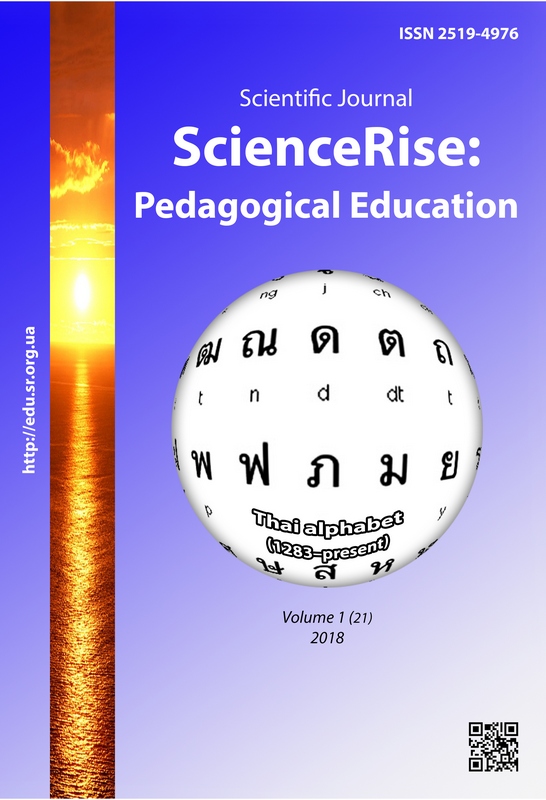Method of the e-learning support system using as a development of informational and communicative competence of the university distance education center employees
DOI:
https://doi.org/10.15587/2519-4984.2018.122132Keywords:
e-learning, distance learning, ICT competence, e-learning support system, high schoolAbstract
The university e-learning support system development is presented in the article. The model analysis of the e-learning support system using as a means of informational and communicative competence development of the university distance education center employees is conducted. The main tasks to be solved by the e-learning support system are formulated. The e-learning support system at the university was developed in the context of a systematic and informational approach in accordance with the main points regarding the characteristic features inherent, on the one hand, to pedagogical, on the other hand, to information systems. The model of e-learning support system as a means of informational and communicative competence development of the university distant education center employees is described. We are assured that the university distant education center employees training will be more effective by using e-learning support system. Implementation of such systems principles extends the space of the learning environment, sets new requirements for the process of acquiring knowledge and skills of universities by distance education centers staff, takes into account individual needs for personal development of employees, professional interests and rationalizes the modern information society needs
References
- Sharable Content Object Reference Model (SCORM) (2004). Advanced Distributed Learning, 57.
- Burov, O. (2014). Virtual Life and Activity: New Challenges for Human Factors/Ergonomics. Symposium "Beyond Time and Space" STO-MP-HFM-231. STO NATO, 8-1–8-8.
- Bykov V. Yu.; Bykov, V. Yu., Kukharenko, V. M. (Eds.) (2008). Tekhnolohiya rozrobky dystantsiinoho kursu. Kyiv: Milenium, 324.
- Bykov, V. Yu. (2012). Innovatsiynyi rozvytok zasobiv i tekhnolohiyi system vidkrytoi osvity. Suchasni informatsiyni tekhnolohiyi ta innovatsiyni metodyky u pidhotovtsi fakhivtsiv: metodolohiya, teoriya, dosvid, problemy, 29, 32–40.
- Bykov, V. Yu., Kukharenko, V. M., Syrotenko, N. H., Rybalko, O. V., Bohachkov, Yu. M.; Bykov, V. Yu., Kukharenko, V. M. (Eds.) (2008). Tekhnolohiya stvorennia dystantsiinoho kursu. Kyiv: Milenium, 324.
- Bykov, V. Yu. (2011). Tekhnolohiyi khmarnykh obchyslen, IKT-autsorsinhta novi funktsiyi IKT-pidrozdiliv navchalnykh zakladiv i naukovykh ustanov. Informatsiyni tekhnolohii v osviti, 10, 8–23.
- Bobrov, L. K., Medyankina, I. P., Osipov, A. L., Pashkov, P. M., Rodionova, Z. V. (2016). О kompetenciyah menedzhera biznes-informacii. NTI, 5, 5–14.
- Danylenko L., Chmil A., Rozmarytsia V. (2006). Ochno-dystantsiyne navchannia u praktytsi roboty TsIPPO. Pisliadyplomna osvita v Ukraini, 42–46.
- Zabolotskyi, A. Yu. (2016). Modeliuvannia systemy dystantsiinoho navchannia VNZ. Naukovi zapysky Berdianskoho derzhavnoho pedahohichnoho universytetu. Ser.: Pedahohichni nauky, 1, 94–99.
- Zabolotskyi, A. Yu. (2016). Problema yakosti dystantsiinoho navchannia. Molodyi vchenyi, 5, 333–335.
- Zabolotskyi, A. Yu. (2016). Suchasnyi stan dystantsiynoho navchannia u VNZ Ukrainy. Visnyk Dnipropetrovskoho universytetu imeni Alfreda Nobelia. Seriya: Pedahohika i psykholohiya, 2, 19–23.
- Morze, N. V., Hlazunova, O. H. (2008). Modeli efektyvnoho vykorystannia informatsiyno-komunikatsiynykh ta dystantsiynykh tekhnolohiyi navchannia u vyshchomu navchalnomu zakladi. Informatsiyni tekhnolohiyi i zasoby navchannia, 2 (6).
- Nad, N. M. (2010). Zastosuvannia bahatofaktornoho rehresiynoho analizu u modeliuvanni ekonomichnykh protsesiv. Naukovyi visnyk Uzhhorodskoho universytetu, 30, 63–67.
- Pinchuk, O. P., Bohachkov, Yu. M., Bykov, V. Yu., Manako, A. F., Oliynyk, V. V., Burov, O. Yu. et. al. (2014). Orhanizatsiya ta funktsionuvannia merezhi resursnykh tsentriv dystantsiynoi osvity zahalnoosvitnikh navchalnykh zakladiv. Kyiv: Atika, 184.
- Filippovich, Yu. N., Prohorov, A. V. (2002). Semantika informacionnyh tekhnologiy: opyty slovarno-tezaurusnogo opisaniya. S predisloviem A. I. Novikova. Moscow: Izd-vo MGUP, 368.
Downloads
Published
How to Cite
Issue
Section
License
Copyright (c) 2018 Anton Zabolotsky

This work is licensed under a Creative Commons Attribution 4.0 International License.
Our journal abides by the Creative Commons CC BY copyright rights and permissions for open access journals.
Authors, who are published in this journal, agree to the following conditions:
1. The authors reserve the right to authorship of the work and pass the first publication right of this work to the journal under the terms of a Creative Commons CC BY, which allows others to freely distribute the published research with the obligatory reference to the authors of the original work and the first publication of the work in this journal.
2. The authors have the right to conclude separate supplement agreements that relate to non-exclusive work distribution in the form in which it has been published by the journal (for example, to upload the work to the online storage of the journal or publish it as part of a monograph), provided that the reference to the first publication of the work in this journal is included.








